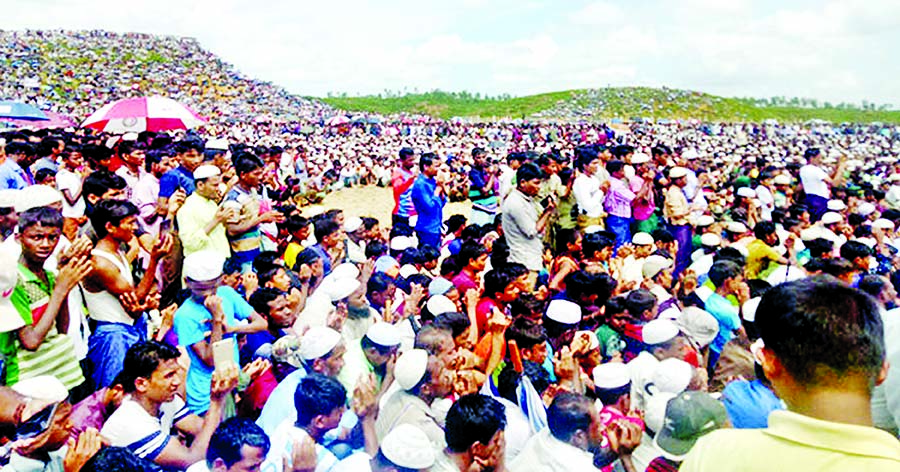
Staff Reporter :
Tens of thousands of Rohingyas held a rally inside their camps in Bangladesh on Sunday, marking two years of their exodus from Rakhine state of Myanmar.
They gathered for the rally at Kutupalong refugee camp in Cox’s Bazar demanding justice against the genocide carried out on Rohingya community by Myanmar security forces that forced them to flee Bangladesh from their native Rakhine state in August 2017.
The Rohingyas also demanded that the international community must keeps on pushing the Myanmar government to establish trust and meet their demands.
More than 700,000 Rohingyas fled over to border to Bangladesh after a military-led crackdown in Rahkine state on 25 August 2017 in response to an alleged attack by Muslim militants on police posts. Then the Myanmar forces razed villages, raped women and killed thousands.
Meanwhile, a UN fact-finding mission has declared the violence had “Genocidal Intent”.
Organized mostly by the Arakan Rohingya Society for Peace and Human Rights (ARSPH), the event was addressed by a number of Rohingya leaders. A nearly 20-minute-long munajat followed before the programme ended.
At the rally, the Rohingya leaders said that they would agree for repatriation if their demand for citizenship in Myanmar is met and a safe environment is ensured for their return to Rakhine state of Myanmar.
They also asked the Myanmar government to give them recognition as Rohingya community, chanting slogan, “We are Rohingya not Bangalee.”
Children, hijab-wearing women, and men in long-skirt lungis shouted “God is Great, Long Live Rohingya” as they marched at the heart of the world’s largest refugee camp to commemorate what they described as “Genocide Day”.
Under the scorching sun, thousands joined in a popular song with the lyrics “The world does not listen to the woes of Rohingya”.
“I have come here to seek justice for the murder of my two sons. I will continue to seek justice till my last breath,” 50-year-old Tayaba Khatun said as tears rolled down her cheeks.
Addressing the rally, the Rohingya leaders said that they would not go back to Myanmar if their demands are not met and they will remain united to realise their demands.
They said that they would return to their homeland only when their safety and security are ensured.
Commissioner of Refugee Relief and Repatriation Commission (RRRC) Abul Kalam said, “August 25 is a difficult day for Rohingyas. They can hold a rally on this day. That’s why the authorities concerned have allowed them to hold the rally.”
Though there was a huge turnout of Rohingyas at the rally, there had been no unpleasant incident during the rally, said Ukhiya thana Officer-in-Charge Abul Mansur.
On Thursday, the second phase repatriation bid of Rohingyas turned futile as no Rohingyas turned up to go back home although necessary measures were taken for their repatriation.
The first batch of Rohingyas was scheduled to return on November 15 last year but it was also halted amid unwillingness of Rohingyas to go back-for lack of a congenial environment in Rakhine state.
Bangladesh is now hosting over 1.1 million Rohingyas, most of whom entered the country since August 25, 2017. The two countries signed a repatriation deal on November 23, 2017, but there has been little progress.
As the repatriation process hit-the-sang, Bangladesh on Sunday urged Myanmar to fully concentrate on implementation of its obligations and commitments necessary for a durable solution to the Rohingya problem.
In a media statement, the government said, Bangladesh has ensured all the necessary arrangements on Bangladesh sides, including security and logistics, for the voluntary return of Rohingyas to northern Rakhine.
“It’s Myanmar’s responsibility to create a conducive environment in Rakhine through decisive actions and reduce the trust-deficit of Rohingyas through appropriate measures, including the dissemination of authentic information on the ground reality,” the media release added.
Meanwhile, the refugees are becoming threat to Bangladeshis. Camps in the coastal district of Cox’s Bazar currently accommodating 1.1 million Rohingyas have turned into hotbeds of crime. Criminal gangs, active in the camps, often lock into bloody confrontations over control of markets, Yaba smuggling, and human trafficking.
Forty-three Rohingyas were killed in the last two years in what have been described as internal conflicts among these gangs. During this period, 32 others died in alleged gunfights with security forces.
Nearly 1,100 Rohingyas have been accused in 471 cases – 208 of them related to narcotics – since the influx began in late August 2017.

